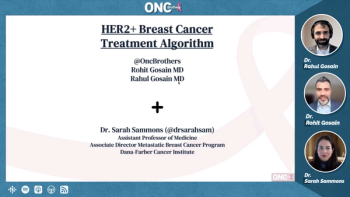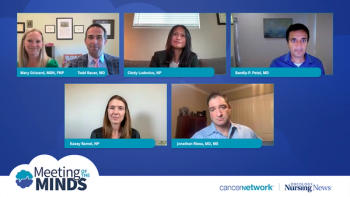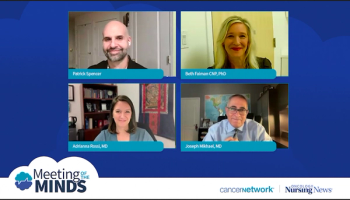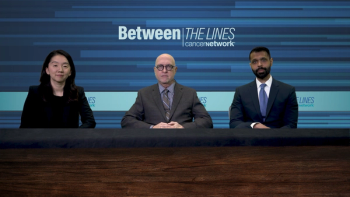
“Even after doing 10,000 of these operations, we are tweaking [the hood technique]…to make things better,” according to Ash Tewari, MD, MBBS, MCh, FRCS.

Your AI-Trained Oncology Knowledge Connection!


“Even after doing 10,000 of these operations, we are tweaking [the hood technique]…to make things better,” according to Ash Tewari, MD, MBBS, MCh, FRCS.

Updated findings from the phase 3 EV-302 trial show enduring responses and survival improvements with enfortumab vedotin plus pembrolizumab.

AI-powered tools may help alleviate doctor burnout and give clinicians more time to directly engage with patients.

An individualized vaccine as well as aerosolized medicines are 2 novel forms of treatment that are under development for managing brain tumors.

Panelists discuss novel agents and strategies being explored for the future treatment of advanced EGFR-mutant NSCLC, sharing optimism about emerging therapies that could significantly improve patient outcomes.

Panelists discuss key aspects of supportive care from the patient perspective in the EGFR-mutant advanced NSCLC journey, focusing on the strategies and resources that have been most helpful in managing symptoms and improving quality of life throughout treatment.

Panelists discuss how, data-free navigation of HER2+ breast cancer treatment requires careful consideration of established guidelines while accounting for individual patient factors. Treatment typically follows a multimodal approach, combining targeted HER2 therapies, chemotherapy, and surgery based on clinical expertise.

Panelists discuss how; the treatment of HER2-positive metastatic breast cancer typically involves HER2-targeted therapies combined with chemotherapy. First-line treatment usually consists of trastuzumab plus pertuzumab with a taxane. Subsequent lines may include T-DM1, tucatinib-based combinations, or other HER2-directed therapies, with treatment selection guided by disease characteristics and prior therapy response.

Panelists discuss how, TDM-1 (Trastuzumab emtansine/Kadcyla) is an antibody-drug conjugate used in HER2-positive breast cancer treatment. This targeted therapy combines Herceptin's cancer-cell targeting ability with a potent chemotherapy drug, delivering treatment directly to cancer cells while minimizing damage to healthy tissue.

Panelists discuss how, locally advanced HER2-positive breast cancer is characterized by overexpression of HER2 proteins with regional spread beyond the primary tumor, involving either extensive lymph node involvement, chest wall, or skin, but without distant metastases. Treatment typically combines targeted HER2 therapy, chemotherapy, and local interventions.

Panelists discuss how, for early-stage HER2-positive breast cancer, standard treatment typically combines surgery with targeted therapy (like trastuzumab/Herceptin), chemotherapy, and often radiation. This multi-modal approach, tailored to individual factors, has significantly improved survival rates for this aggressive subtype.

The hood technique, developed by Ash Tewari, MD, aids in facilitating earlier returns of continence with reduced residual cancer rates.

This video episode compares ide-cel and cilta-cel for patient selection, examining specific characteristics, efficacy and safety profiles, and their influence on treatment decisions across diverse patient groups.

This video segment discusses the efficacy and safety profile of adagrasib for KRAS-positive metastatic NSCLC, drawing insights from the KRYSTAL-1 trial data to inform treatment sequencing decisions.

A 58-year-old retired teacher treated with adagrasib for KRAS+ metastatic NSCLC.

Artificial intelligence may have the potential to enrich pathology practices to help identify aspects of tumor biology not seen with the human eye.

This segment explores Dr. Rossi's clinical experience with cilta-cel as a second-line therapy, focusing on its efficacy and quality-of-life benefits across diverse patient populations.

This segment examines the evidence supporting cilta-cel in second-line therapy, highlighting key outcomes from the CARTITUDE trials and comparing them to other available second-line treatment options for multiple myeloma.

Panelists discuss how the treatment landscape for patients with transplant-ineligible/deferred newly diagnosed multiple myeloma (NDMM) is expected to evolve, with considerations for optimizing therapeutic approaches based on emerging data from novel drug combinations and treatment strategies.

Panelists discuss how the adoption of immunotherapy-chemotherapy combinations in clinical practice requires careful consideration of both long-term safety profiles and sustained efficacy data. A 5-year follow-up period generally provides valuable insights into delayed adverse events and durability of response, which helps inform risk-benefit assessments. The balance between safety and efficacy should be evaluated on a patient-specific basis, considering factors such as performance status, comorbidities, and tumor characteristics.

Panelists discuss how successful implementation of chimeric antigen receptor (CAR) T-cell therapy in relapsed/refractory multiple myeloma (R/R MM) depends on early referral, coordinated care between academic and community centers, standardized protocols for patient management, and careful consideration of product selection and timing based on individual patient factors.

Panelists discuss how managing a 68-year-old patient with newly diagnosed multiple myeloma (MM) with suboptimal response to Dara-VRd (daratumumab plus bortezomib, lenalidomide, and dexamethasone) requires careful consideration of timing for CAR T referral, product selection, and bridging strategies, while balancing the patient’s preference against standard transplant options in the context of non-high-risk disease.

Panelists discuss how the long-term follow-up data from CheckMate649 are crucial for understanding the durability of nivolumab plus chemotherapy’s benefit in first-line advanced gastric cancers (GCs)/gastroesophageal junction cancers (GEJCs). The survival outcomes help validate this regimen’s position as a standard of care, particularly for patients with PD-L1 combined positive score (CPS) ≥ 5. Although the magnitude of benefit varies by PD-L1 expression, both overall survival (OS) and progression-free survival (PFS) data inform personalized treatment decisions, with stronger evidence supporting immunotherapy use in higher PD-L1–expressing tumors while maintaining use across most patient subgroups.

Panelists discuss how frailty assessment influences treatment decisions in patients with transplant-ineligible newly diagnosed multiple myeloma (NDMM), particularly examining the IFM2017-03 study’s evaluation of a dexamethasone-sparing approach using daratumumab plus lenalidomide in frail patients.

Efficacy results from the MASAI trial preceded the creation of the UK-funded EDITH trial, assessing 5 AI platforms in 700,000 women undergoing mammography.

Findings from DESTINY-Breast06 showed a PFS of 13.2 months for patients given T-DXd for HER2-low or ultralow breast cancer.

Combining sotorasib with panitumumab may reduce the burden of disease in patients with KRAS G12C-mutated metastatic colorectal cancer.

Dr. Kim provides an overview of the clinical evidence supporting lorlatinib as a first-line therapy for ALK+ metastatic NSCLC, focusing on the key efficacy outcomes from the phase 3 CROWN trial.

Dr. Garon discusses the factors that make a patient a strong candidate for ALK inhibitor therapy in ALK+ NSCLC, the importance of biomarker testing in guiding treatment selection, and his approach to testing along with challenges encountered, especially in community settings.

Aditya Bardia, MD, MPH, FASCO, spoke about how the FDA approval of T-DXd in HER2-low or ultralow breast cancer will allow for a broader treatment range.